This Special Release presents data on construction statistics from approved building permits for the National Capital Region (NCR) Provincial Statistical Office III - City of Pasig for the fourth quarter of 2019. Figures are based on the preliminary results of the tabulated data from collected building permits.
Number of approved building permits decreases by 53.1 percent in the fourth quarter
The number of approved building permits in Pasig City decreased by 53.1 percent to 100 during the fourth quarter of 2019 from 213 of the same quarter of the previous year. Also, the total value of construction decreased by 53.9 percent to ₱0.5 billion during the fourth quarter of 2019 from ₱1.1 billion of the same quarter of 2018.
Relative to the entire region, Pasig City contributed 3.4 percent to the number of approved building permits and 1.5 percent to the total value of construction during the fourth quarter of 2019. See Table 1 for details.
Table 1. Number, Floor Area, Value and Average Cost per Floor Area of Building Construction of the Philippines, National Capital Region, and the City of Pasig for the Fourth Quarter of 2018 and 2019

Source: Private Construction Statistics, Industry Statistics Division, PSA
Note: p-preliminary
Number of approved building permits for residential and non-residential type of building decreases
The number of residential types of building decreased by 53.4 percent to 27 during the fourth quarter of 2019 from 58 during the same period of the previous year. Also, the number of non-residential types of building decreased by 37.5 percent to 10 during the fourth quarter of 2019 from 16 of the same quarter of the previous year.
Moreover, combined approved building permits for additions and alterations/repairs went down by 54.7 percent to 63 building permits during the fourth quarter of 2019 from 139 of the same quarter of the previous year.
Figure 1 compares the number of approved building permits by type of building for the City of Pasig during the fourth quarter of 2018 and 2019. Refer to Table 2 for details.
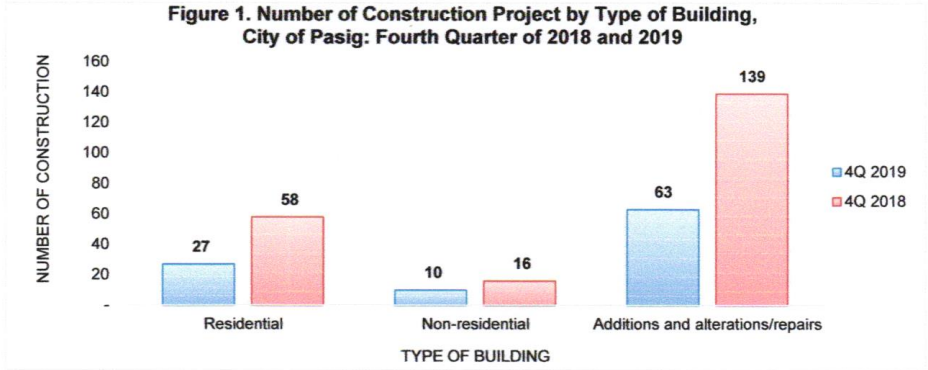
Source: Private Construction Statistics, Industry Statistics Division, PSA
Value of construction for residential type of building goes down
The aggregate value of construction for residential type of building in Pasig City decreased by 84.1 percent to ₱115.4 million in the fourth quarter of 2019 from ₱727.4 million during the same quarter of the previous year. Meanwhile, the value of construction for non–residential type of building went up by 45.5 percent to ₱293.5 million in fourth quarter of 2019 from ₱201.7 million in the same quarter of 2018. The total value for additions and alterations/repairs decreased by 41.5 percent to ₱92.3 million in the fourth quarter of 2019 from ₱157.8 million during the same quarter of 2018.
Figure 2 presents the value of construction by type of building for the Pasig City for the fourth quarter of 2018 and 2019. Refer to Table 2 for details.
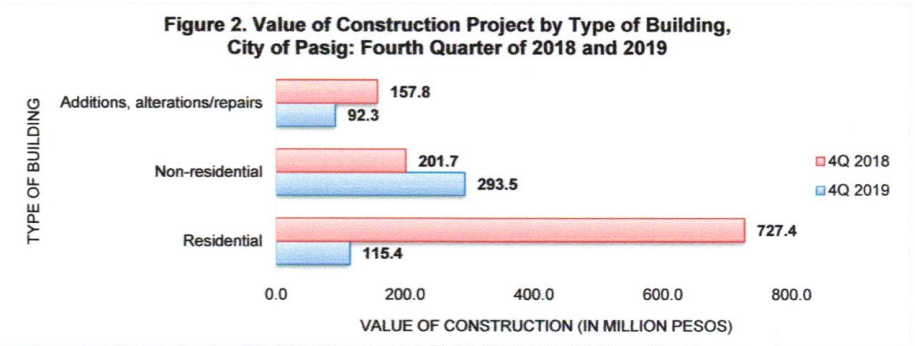
Source: Private Construction Statistics, Industry Statistics Division, PSA
Single residential units record the highest number of approved building permits and apartment/accessoria registers the highest value of construction
Among the types of residential building, single residential units registered the highest number of approved building permits with 14 applications or 51.9 percent and apartment/accessoria recorded the highest value of construction amounting to ₱68.4 million or 59.3 percent of the total value of residential building construction.
Figures 3 and 4 present the percentage distribution of the number and value of residential construction by type in Pasig City during the fourth quarter of 2019. Refer to table 2 for details.
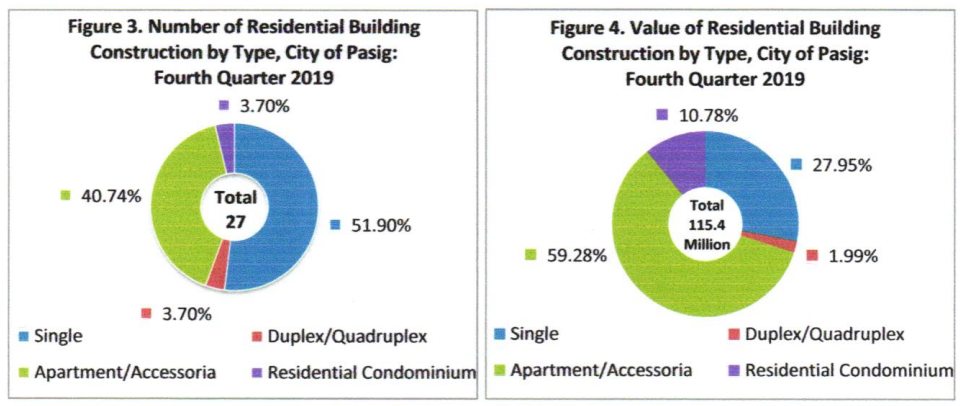
Source: Private Construction Statistics, Industry Statistics Division, PSA
Commercial type of building ranks the highest number among non-residential building construction
Among the types of non-residential building, the commercial type recorded the highest total number with 6 applications, comprising 60.0 percent of the total number and institutional type registers the highest aggregate value of ₱241.1 million or 82.2 percent of the total value of non-residential building construction.
Figures 5 and 6 present the percentage distribution of the number and value by type of non-residential building construction in the Pasig City during the fourth quarter of 2018. Refer to Table 2 for details.
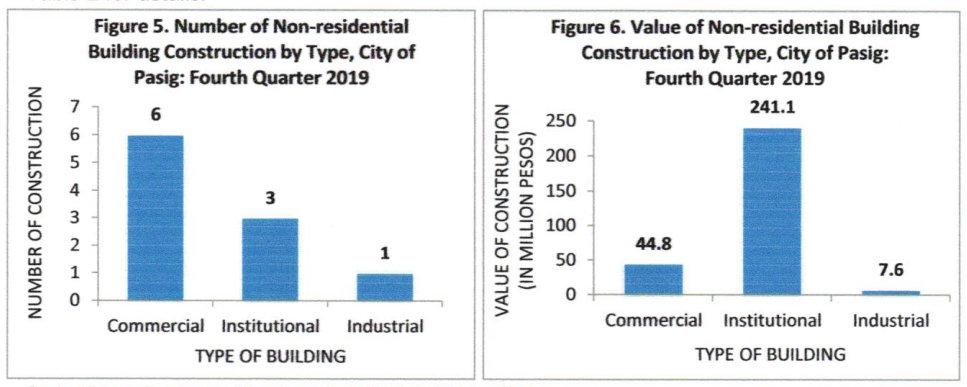
Source: Private Construction Statistics, Industry Statistics Division, PSA
Table 2. Number, Floor Area, Value and Average Cost per Floor Area of Building Construction by Type of Building, City of Pasig: Fourth Quarter of 2018 and 2019
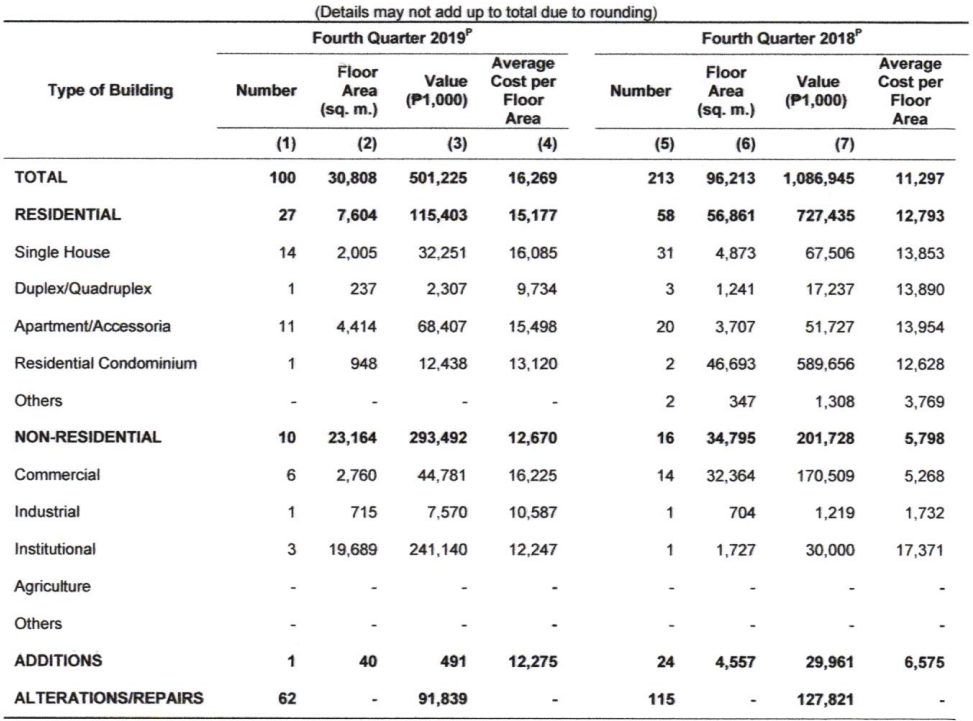
Source: Private Construction Statistics, Industry Statistics Division, PSA
Note: p-preliminary
Explanatory Notes
Scope and Coverage
Private construction statistics from approved building permits relate to new constructions and additions, alterations and repairs of existing residential and non-residential buildings and other structures undertaken in all regions/provinces of the country.
Source of Information
Data are from the original applications of approved building permits collected by PSA-NCR Provincial Statistical Office III field personnel from Local Building Officials in the City of Pasig.
Limitations:
1. Data on building constructions refer to those approved applications during the reference period and not to construction work completed during the reference period.
2. The completeness of the number of building permits collected relies on the approval of applications filed with the LBOs. Hence, private building constructions without approved building permits are excluded in the tabulation of data.
Definition of Terms:
Building Permit - A written authorization granted by the Local Building Official (LBO) to an applicant allowing him to proceed with the construction of a specific project after plans, specifications and other pertinent documents have been found to be in conformity with the National Building Code (PD 1096).
Building - Any independent, freestanding structure comprised of one or more rooms or other spaces, covered by a roof and enclosed with external walls or dividing walls, which extend from the foundation to the roof.
Construction - All on-site work done from site preparation, excavation, foundation, assembly of all the components and installation of utilities and equipment of buildings/structures.
Residential Building - A building for which its major parts or more than half of its gross floor area built for dwelling purposes. This type of building can be of the single type, duplex, an apartment and/or accessoria and residential condominium.
Single House - A complete structure intended for a single family or household, i.e. bungalow, 2-storey house, nipa hut.
Duplex - A structure intended for two households, with complete living facilities for each; it is a single structure divided into two dwelling units by a wall extending from the floor to the ceiling.
Apartment - A structure, usually of two storeys, made up of independent living quarters, with independent entrances from internal walls and courts.
Accessoria – Is a one or two-floor structure divided into several dwelling units, each dwelling unit having its own separate entrance from the outside.
Residential Condominium - A structure, usually of several storeys, consisting of multiple dwelling units.
Other residential constructions - Consist of school or company staff houses, living quarters for drivers and maids, and guardhouses.
Non-Residential Building - This type includes commercial, industrial, agricultural and institutional buildings.
Commercial Buildings - Office buildings and all buildings that are intended for use primarily in wholesale, retail and service trades; i.e. stores, hotels, restaurants, banks, etc.
Industrial Buildings - Buildings which are used to house the production, assembly and warehousing activities of industrial establishments; i.e. factories, plants, mills, repair shops, machine shops, printing press, storage plant, electric generating plants
Institutional Buildings - Buildings that are primarily engaged in providing educational instructions and hospital/health care; ports, airports and other government buildings; i.e. school, museums, libraries, sanitaria, churches, hospitals.
Agricultural Buildings - Buildings which are used to house live stocks, plants and agricultural products such as barn, poultry house, piggeries, stables, greenhouses and grain mill.
Other Non-Buildings Constructions - These include cemetery structures, street furniture, waiting sheds, communication towers, etc.
Addition - Any new construction that increases the height or area of an existing building/structure.
Alteration - Construction in a building/structure involving changes in the materials used, partitioning, location/size of openings, structural parts, existing utilities and equipment but does not increase the overall area thereof.
Repair – A remedial work done on any damaged or deteriorated portion/s of a building/structure to restore its original condition.
Floor Area of Building - The sum of the area of each floor of the building measured to the outer surface of the outer walls including the area of lobbies, cellars, elevator shafts and all communal spaces in multi-dwellings. Areas of balconies are excluded.
Total Value of Construction - The sum of the cost of building, electrical, mechanical, plumbing, and others. The value is derived from the approved building permit and represents the estimated value of the building or structure when completed.
For more details, please visit
For more details, please visitFor more details, please visit
www.rssoncr.psa.gov.ph/ncr3
www.rssoncr.psa.gov.ph
www.psa.gov.ph
PACIANO B. DIZON
Regional Director
Officer-In-Charge
NCR Provincial Statistics Office III
